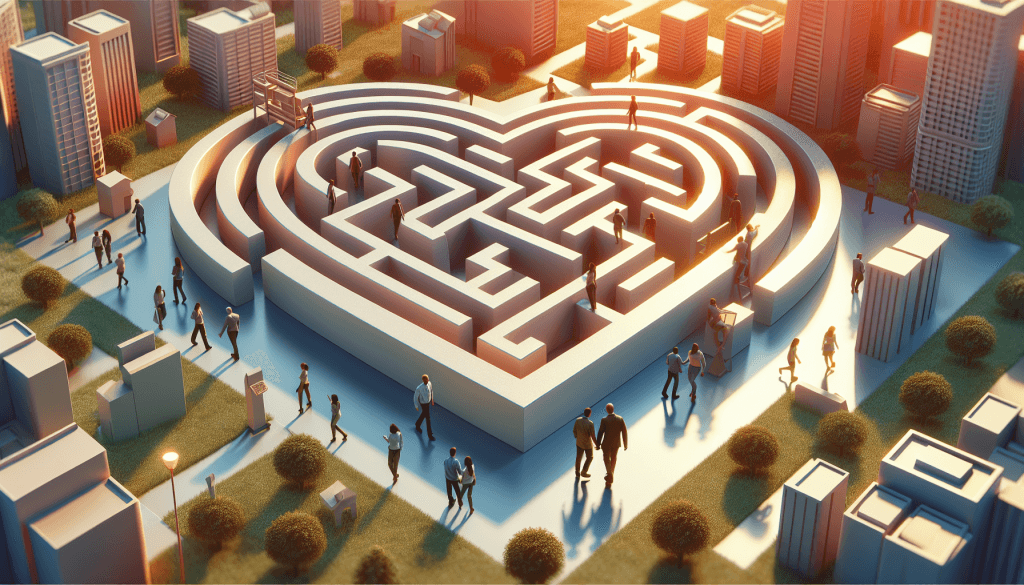Navigating through relationship challenges can feel like trying to steer a ship through stormy seas. It’s not always smooth sailing, but with the right tools and mindset, you and your partner can weather any storm together. Relationships thrive when both partners are committed to growth, communication, and understanding. So, if you’re ready to explore how to tackle these challenges head-on, keep reading—this guide is packed with insights to help you strengthen your bond.
Key Takeaways
- Relationships go through different phases, each with its own challenges.
- Communication is the backbone of overcoming difficulties.
- Conflicts can be opportunities for growth if approached with the right mindset.
- Unique situations, like long-distance or chronic illness, require extra care and effort.
- Building a stronger partnership involves emotional intimacy and shared goals.
Understanding Relationship Challenges
Every relationship faces hurdles. These challenges often arise from the natural progression of life, external pressures, or misunderstandings. Let’s break it down.
Common Phases of Relationships
Beginnings: Building a Strong Foundation
The early days of a relationship are often filled with excitement and discovery. You’re learning about each other’s quirks, dreams, and fears.
But even in this honeymoon phase, challenges can pop up. Misaligned expectations or communication gaps can create tension. The key here is to establish trust and mutual respect early on.
Middles: Navigating Growth and Change
As time passes, life throws curveballs—career changes, family responsibilities, or personal growth. These shifts can test your relationship.
It’s crucial to adapt and grow together rather than apart. This phase is where teamwork becomes essential.
Ends: Managing Transitions and Closures
Not all relationships last forever, and that’s okay. Whether it’s a breakup or a transition to a new dynamic, endings can be painful but also transformative.
Approaching closures with kindness and clarity can help both partners heal and move forward.
Recognizing the Impact of External Factors
Health Challenges and Their Influence on Relationships
Health issues, whether physical or mental, can strain even the strongest bonds. Chronic illnesses, for instance, often require patience, empathy, and adaptability.
If you or your partner are navigating such challenges, it’s important to educate yourselves and seek support. This resource offers valuable insights into managing relationships affected by chronic illness.
Misconceptions About Dating with Chronic Illnesses
There’s a stigma around dating with chronic illnesses that can lead to misunderstandings. Open communication and education are vital to breaking down these barriers.

The Role of Communication in Overcoming Challenges
Communication is the glue that holds relationships together. Without it, even the strongest connections can crumble.
Importance of Open and Honest Dialogue
Sharing Personal Struggles and Health Journeys
Being vulnerable with your partner can feel scary, but it’s essential for building trust. Share your fears, struggles, and triumphs—it brings you closer.
Addressing Misunderstandings Proactively
Misunderstandings are inevitable, but ignoring them only makes things worse. Address issues as they arise to prevent resentment from building up.
Finding Your Communication Style
Identifying Each Partner’s Language of Expression
Everyone communicates differently. Some people are verbal, while others express themselves through actions. Understanding your partner’s style can prevent miscommunication.
Balancing Listening and Speaking
Communication isn’t just about talking; it’s about listening too. Strive for a balance where both partners feel heard and understood.

Turning Conflicts into Opportunities for Growth
Conflict doesn’t have to be destructive. In fact, it can be a stepping stone to a deeper connection.
Viewing Arguments as Passionate Debates
Shifting Perspectives on Disagreements
Instead of seeing arguments as fights, view them as passionate discussions. This shift in mindset can reduce defensiveness and encourage problem-solving.
Using Conflicts to Foster Deeper Connections
When handled well, conflicts can reveal what truly matters to each partner. This understanding can strengthen your bond.
Strategies for Conflict Resolution
Staying Calm and Focused During Disagreements
Easier said than done, right? But staying calm helps you think clearly and communicate effectively.
Finding Common Ground and Compromise
Compromise isn’t about losing; it’s about finding a win-win solution. Focus on what you both value and build from there.

Navigating Unique Relationship Scenarios
Some relationships face additional challenges, like long-distance or chronic illness. These situations require extra effort and creativity.
Long-Distance Relationships
Maintaining Connection Through Intentional Effort
Long-distance relationships thrive on intentionality. Regular calls, surprise gifts, and shared activities (even virtually) can keep the spark alive.
Building Trust and Understanding Despite the Distance
Trust is the bedrock of any relationship, but it’s especially crucial when you’re miles apart. Be honest, consistent, and supportive.
For more tips, check out this guide.
Relationships Involving Chronic Illnesses
Overcoming Misconceptions and Stigma
Education is key to breaking down misconceptions about chronic illnesses. The more you understand, the more supportive you can be.
Supporting Each Other Through Uncertainties
Life with a chronic illness is unpredictable. Being there for each other, no matter what, can make all the difference.

Building a Stronger Partnership Together
A strong partnership doesn’t happen by accident. It takes effort, intention, and a lot of love.
Engaging in Meaningful Conversations
Discussing Goals, Values, and Future Plans
Talk about your dreams, values, and where you see yourselves in the future. These conversations create alignment and shared purpose.
Addressing Fears and Insecurities Openly
We all have fears and insecurities. Sharing them with your partner can bring you closer and foster mutual support.
Strengthening Emotional Intimacy
Practicing Empathy and Understanding
Empathy is about putting yourself in your partner’s shoes. It’s a powerful way to deepen your connection.
Celebrating Small Victories Together
Life is full of little wins—celebrate them! Whether it’s a promotion, a health milestone, or just surviving a tough week, these moments matter.
Relationships are a journey, not a destination. They require effort, patience, and a willingness to grow together. If you’re facing challenges, remember that you’re not alone. Seeking support, whether through therapy or trusted resources, can make a world of difference. For more insights, explore how emotional regulation impacts relationships or why seeking support during tough times is crucial.
By working together, you and your partner can turn challenges into opportunities for growth and build a bond that’s stronger than ever.
FAQ: How To Navigate Through Relationship Challenges Together? Let’s Strengthen Your Bond!
What are the common causes of relationship challenges?
Common causes include communication breakdowns, unmet expectations, financial stress, differing values, and lack of quality time together. Recognizing these issues early can help in addressing them effectively.
How can we improve communication in our relationship?
Improving communication involves active listening, expressing feelings honestly but respectfully, and ensuring both partners feel heard. Setting aside dedicated time to talk without distractions can also help.
What should we do when we disagree on important matters?
Focus on understanding each other’s perspectives rather than ‘winning’ the argument. Compromise and finding a middle ground are key. If needed, revisit the discussion after emotions have settled.
How can we rebuild trust after it’s been broken?
Rebuilding trust requires transparency, consistent actions, and patience. The person who broke the trust must take accountability, while the other partner should be open to gradual healing and forgiveness.
What role does self-care play in resolving relationship challenges?
Self-care helps individuals manage stress and maintain emotional balance, which positively impacts the relationship. When both partners prioritize their well-being, they can approach challenges with a clearer mindset.
How can we keep the spark alive during tough times?
Small gestures of love, regular date nights, and expressing gratitude can help maintain intimacy. Remembering why you fell in love and creating new shared experiences can reignite the connection.
When should we consider seeking professional help for our relationship?
If challenges persist despite your efforts or if communication becomes toxic, seeking a therapist or counselor can provide tools and guidance to navigate through difficulties effectively.
How do we balance individual needs with the needs of the relationship?
Balancing individual and relationship needs requires open communication and mutual respect. Encourage each other’s personal growth while ensuring the relationship remains a priority.
What are some strategies to handle external stress affecting our relationship?
Discuss external stressors openly and support each other in managing them. Establish boundaries to prevent external issues from dominating your relationship, and focus on teamwork to tackle challenges together.
How can we prevent small issues from escalating into bigger problems?
Address concerns as they arise instead of letting them fester. Practice empathy, avoid blame, and work together to find solutions before small issues grow into significant conflicts.



